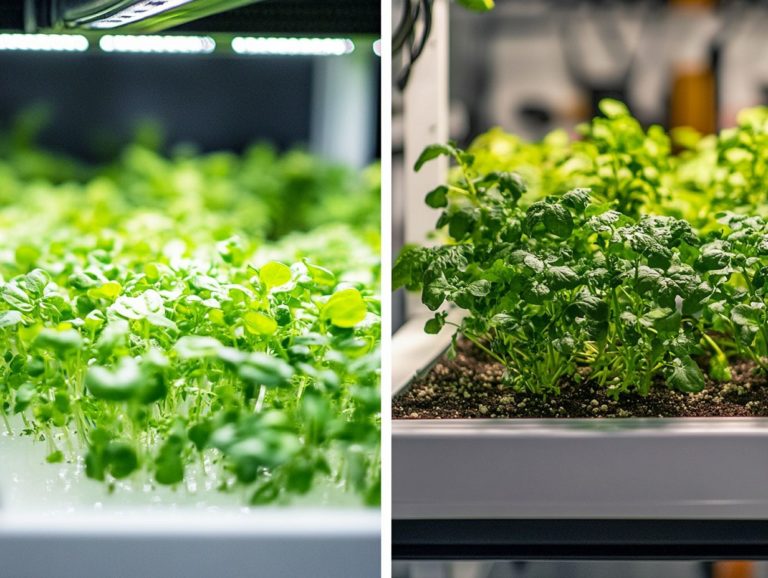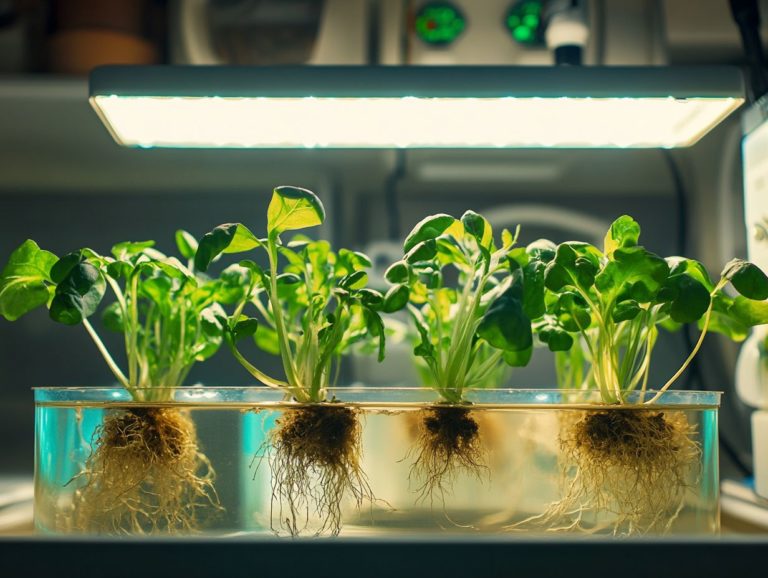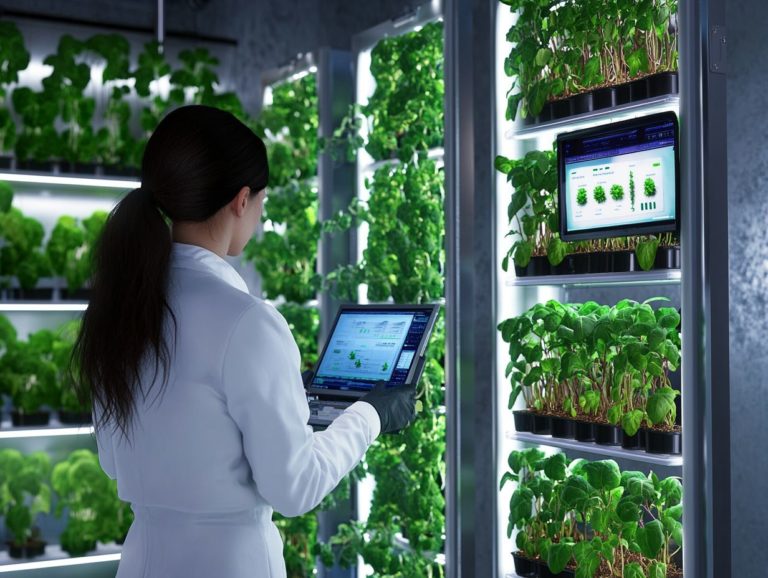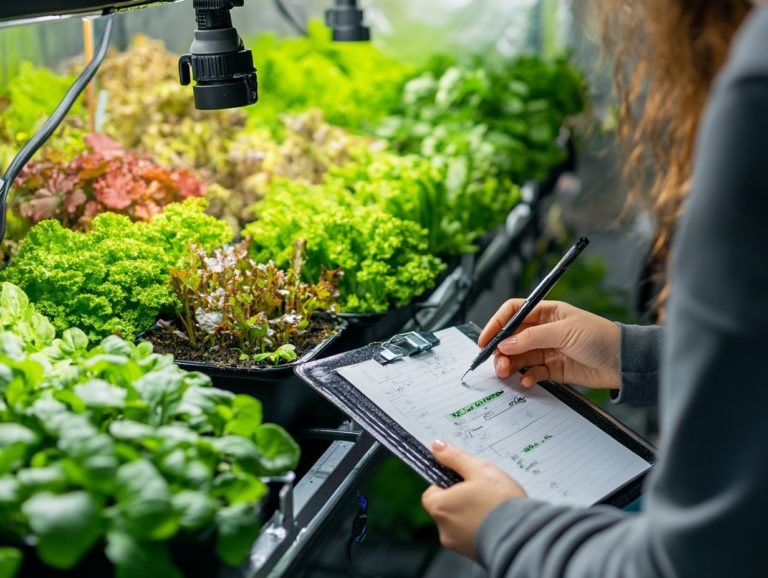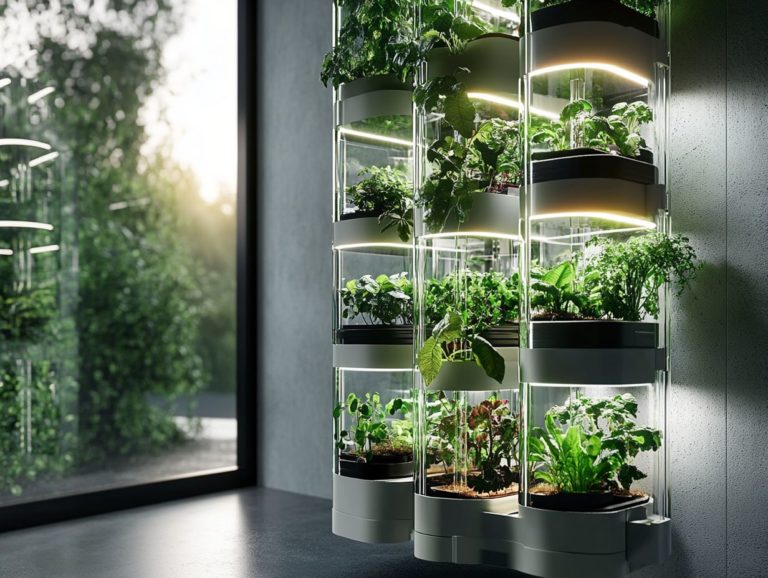Can I Use Tap Water for Hydroponics?
Hydroponics presents a revolutionary approach to cultivating plants without soil, placing a premium emphasis on water quality to achieve optimal growth.
As you embark on this journey, you might find yourself questioning whether tap water will suffice. The reality, however, is more nuanced than it appears.
This article delves into the intricate relationship between hydroponics and water quality, shedding light on the potential risks posed by contaminants often found in tap water. This article also outlines the advantages of opting for filtered or distilled water and offers practical methods for achieving effective filtration.
Discover how choosing the right water can make a huge difference in your hydroponic success!
Contents
- Key Takeaways:
- Understanding Hydroponics and Water Quality
- Potential Risks of Using Tap Water for Hydroponics
- Benefits of Using Filtered or Distilled Water for Hydroponics
- Methods for Filtering Tap Water for Hydroponics
- Frequently Asked Questions
- Can I Use Tap Water for Hydroponics?
- What are the criteria for using tap water in hydroponics?
- How can I test if my tap water is suitable for hydroponics?
- Can I use tap water if it has a high mineral content?
- What should I do if my tap water is not suitable for hydroponics?
- Are there any benefits to using tap water for hydroponics?
Key Takeaways:
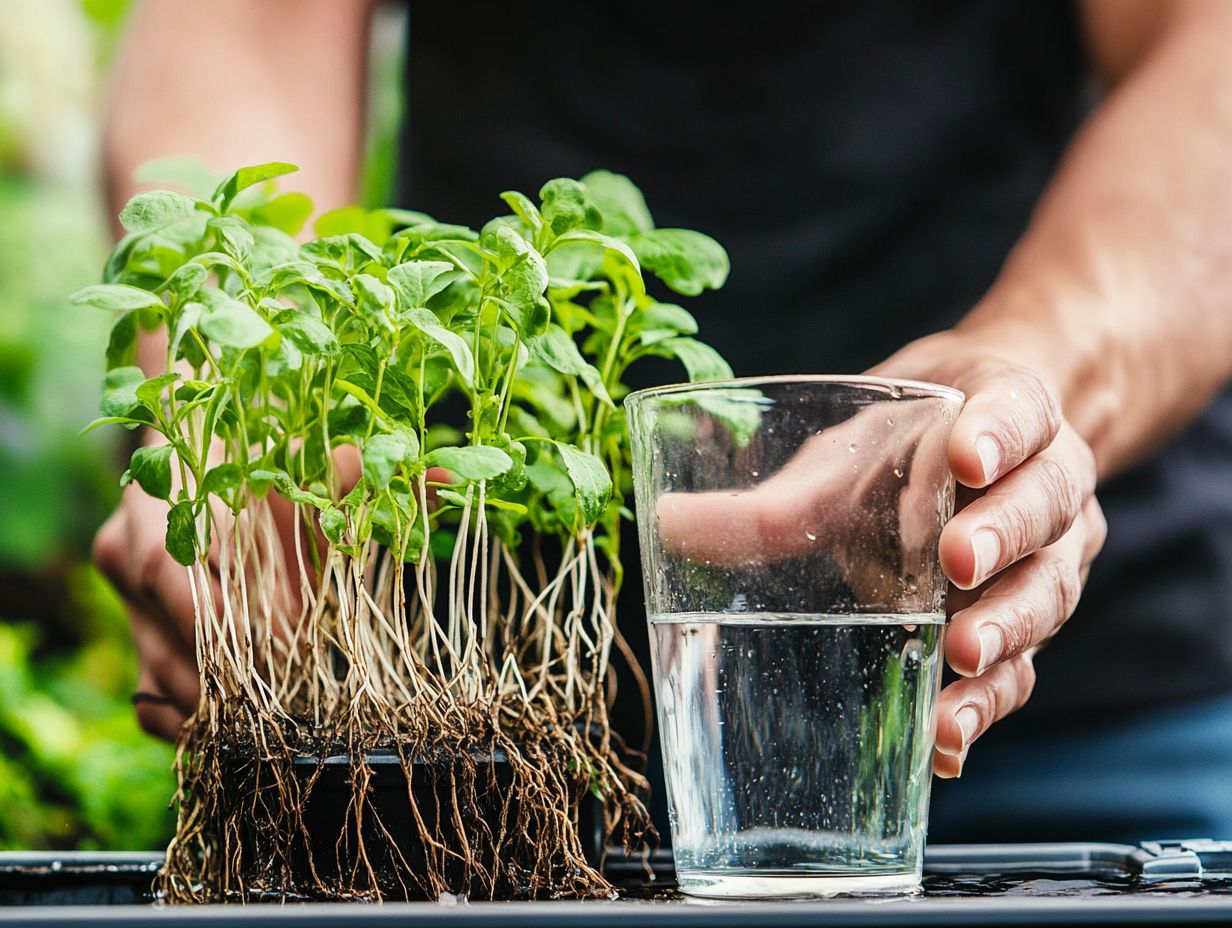
- Tap water may contain contaminants that can harm your hydroponic plants.
- Filtered or distilled water can improve plant growth and health in hydroponic systems.
- There are various methods for filtering tap water for hydroponics. Consider factors such as cost and effectiveness before choosing a method.
Understanding Hydroponics and Water Quality
Hydroponics is a groundbreaking approach to cultivating plants without the need for soil, relying instead on nutrient-rich water solutions. To achieve optimal plant growth, it s essential for you to grasp the intricacies of water quality, particularly when your water comes from city water systems.
The success of hydroponic systems hinges on water chemistry, which encompasses the right parts per million (PPM) levels. Mastering these elements will ensure your plants thrive and absorb nutrients effectively.
pH balance and an ideal mix of dissolved minerals are also crucial. Staying within the ideal pH range is essential for optimal uptake of vital minerals. Don’t forget that environmental factors such as temperature and light intensity influence how well your plants can utilize these nutrients.
Thus, maintaining proper water quality ensures efficient nutrient delivery and promotes robust plant health within your hydroponic system.
Potential Risks of Using Tap Water for Hydroponics
Relying on tap water for hydroponics can introduce considerable risks. The array of chemical contaminants it may contain includes chlorine, chloramine, and heavy metals.
These substances can negatively impact plant growth and compromise the overall health of your hydroponic system.
Contaminants and Impurities in Tap Water
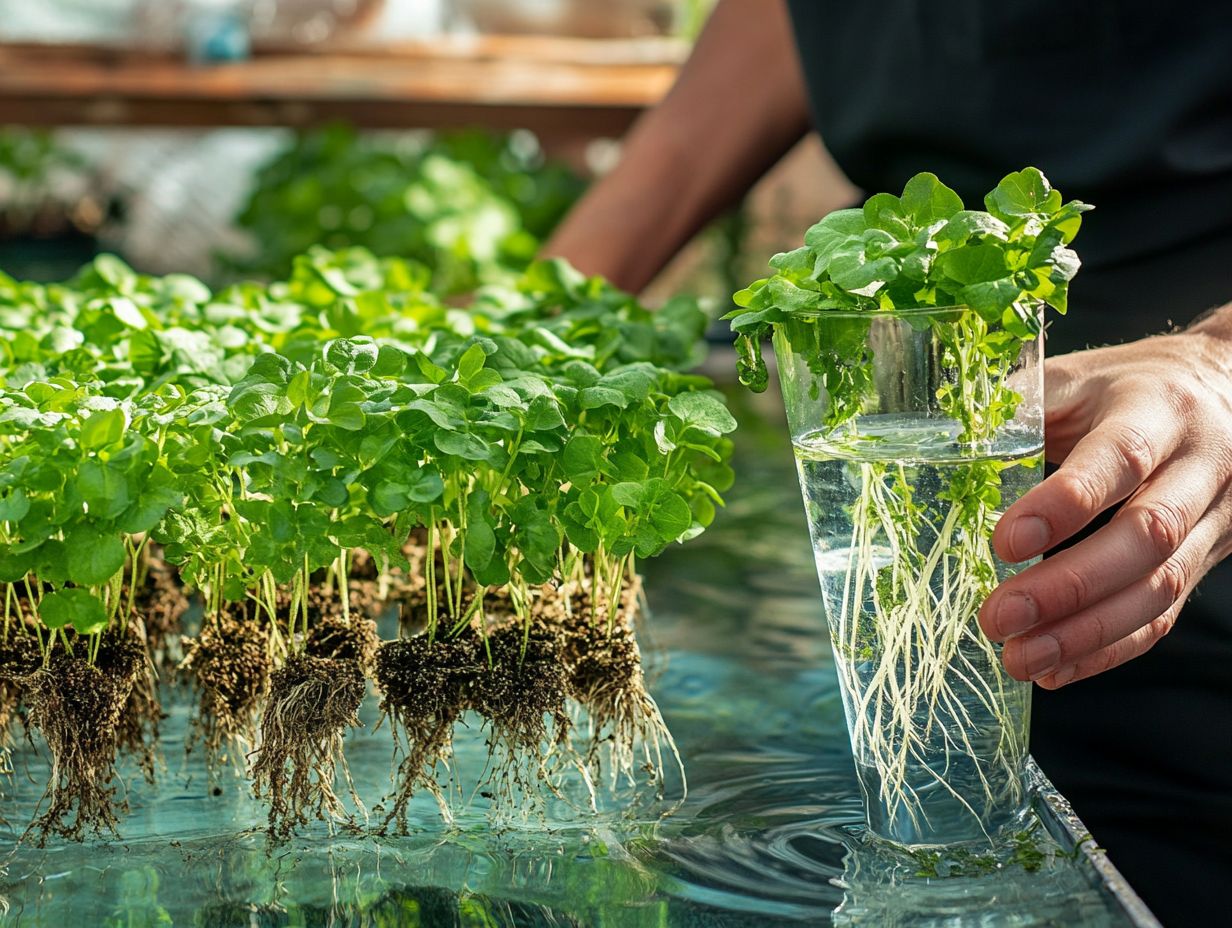
Tap water can harbor a variety of contaminants, including chlorine, chloramine, and heavy metals. All of these can disrupt the delicate balance necessary for optimal nutrient absorption in hydroponics gardening.
These impurities often stem from municipal treatment processes, aging infrastructure, or runoff from agricultural activities. For instance, chlorine and chloramine, routinely added to disinfect water supplies, can interfere with the beneficial microorganisms essential for nutrient uptake.
Understanding these elements is crucial for you as a hydroponics enthusiast. If you’re aiming to create a thriving, sustainable environment, it s vital to ensure that your crops receive clean and safe water.
Benefits of Using Filtered or Distilled Water for Hydroponics
Using filtered or distilled water in hydroponics offers numerous benefits. You ll enjoy an enhanced nutrient balance, leading to strong plant growth. This practice also promotes beneficial bacteria that create an ideal environment for your plants to thrive.
This practice leads to optimal results in your hydroponic endeavors.
Improving Plant Growth and Health
Filtered water is vital for promoting the growth and health of your plants in hydroponic systems. It provides a pure nutrient solution free from harmful chemicals and contaminants, ensuring essential minerals and nutrients are easily absorbed by the roots. This results in stronger stems and greener leaves.
In contrast, using unfiltered water exposes your plants to unwanted substances like chlorine and heavy metals, which can hinder growth and negatively affect overall yield. By opting for filtered water, you not only improve the purity of your nutrient solutions but also enhance the pH stability, creating an ideal environment for your hydroponic plants.
As a result, your whole system works better, leading to faster growth rates and more robust plants. Investing in filtered water provides a significant advantage for anyone cultivating crops in a hydroponic setup.
Methods for Filtering Tap Water for Hydroponics
You have several effective methods for filtering tap water in your hydroponics system. Techniques like reverse osmosis and activated carbon filtration systems can dramatically improve water quality by removing harmful contaminants.
Options for Filtering and Purifying Tap Water
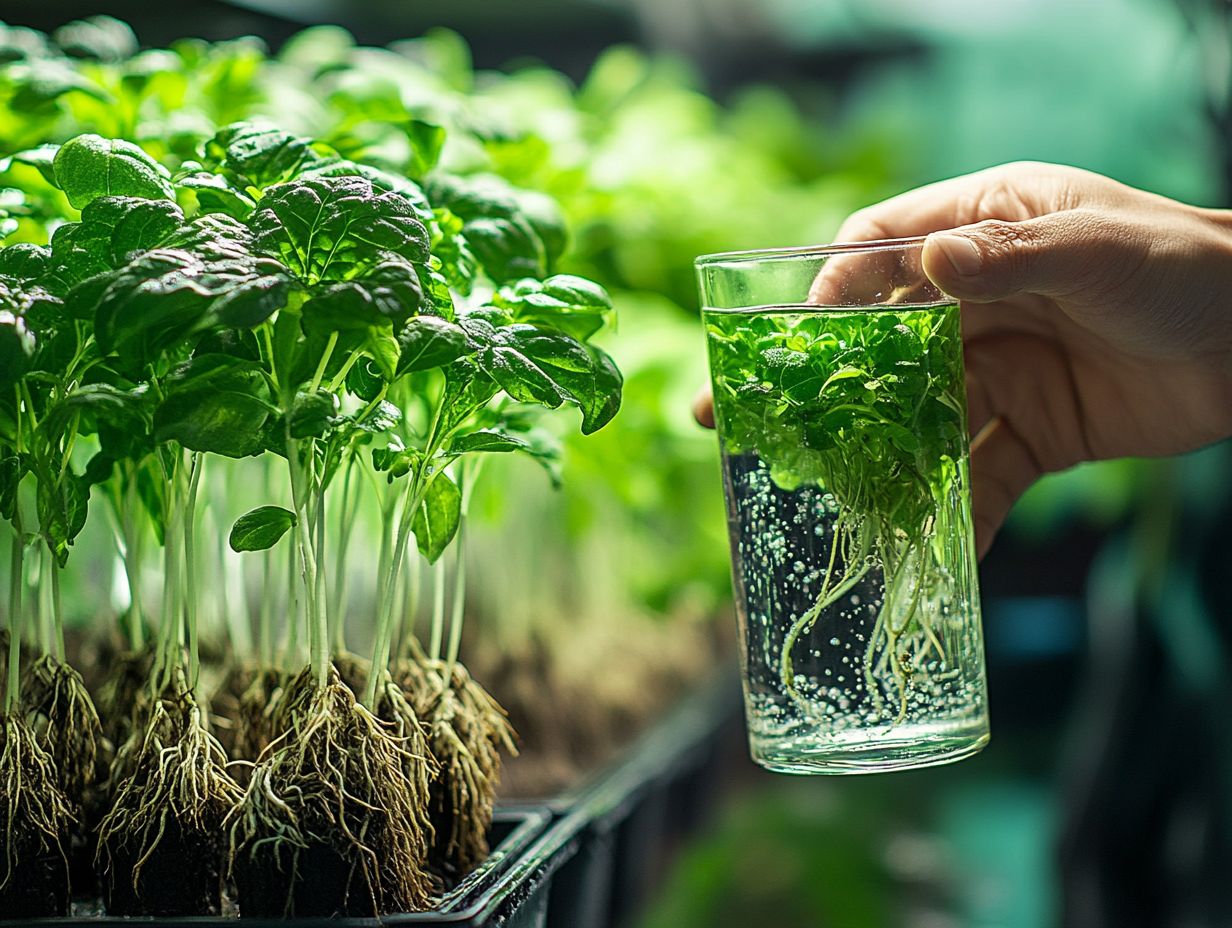
When filtering and purifying your tap water, two prominent options stand out: reverse osmosis systems and activated carbon filters. Each method targets specific contaminants while improving overall water quality.
Reverse osmosis systems excel at removing a wide range of impurities, including heavy metals and microorganisms, providing some of the purest water available. However, they tend to be energy-intensive and may require complex setups with multiple maintenance stages.
On the other hand, activated carbon filters are simpler to install and maintain. They effectively remove chlorine, sediment, and volatile organic compounds, significantly enhancing the taste and odor of your water. However, be aware that they may not be as effective against certain contaminants, such as nitrates or microbial threats.
As a hydroponic grower, carefully consider these advantages and drawbacks. Choose the filtration method that best aligns with your needs and the specific requirements of your crops.
Factors to Consider and Final Recommendations
When choosing a water purification method for your hydroponics garden, assess water quality, safety concerns, and your system’s needs to ensure optimal plant growth.
Check where your water comes from, any existing contaminants, and the micronutrient requirements of your plants. These factors will guide your decision-making process.
Various purification methods, such as reverse osmosis, UV filtration, and activated carbon systems, each have their strengths and weaknesses. For instance, while reverse osmosis effectively removes many impurities, it can also strip away beneficial minerals essential for plant health.
To combat common challenges like algae growth and pH imbalance, regularly test the purified water and adjust your system as needed. This proactive approach ensures your plants receive clean water and fosters a thriving hydroponic environment.
Frequently Asked Questions
Can I Use Tap Water for Hydroponics?
Yes, you can use tap water for hydroponics as long as it meets specific criteria, such as low levels of chlorine and no heavy metals.
What are the criteria for using tap water in hydroponics?
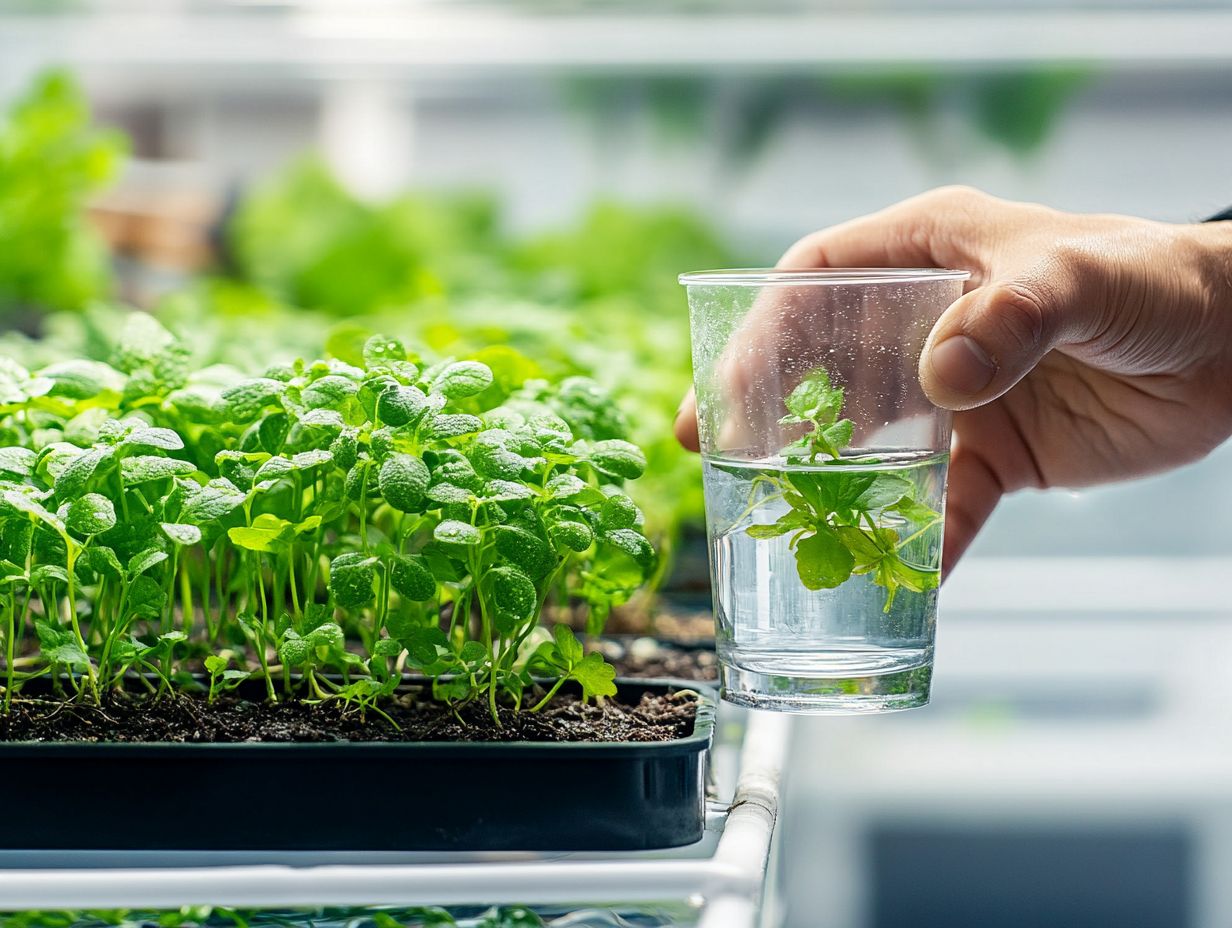
Tap water should have a neutral acidity level (pH), no chlorine or fluoride, and low levels of minerals and contaminants.
How can I test if my tap water is suitable for hydroponics?
You can buy a water testing kit or take a sample to a local lab for analysis.
Can I use tap water if it has a high mineral content?
It’s best to avoid tap water with high mineral content. This can cause nutrient imbalances and harm your plants.
What should I do if my tap water is not suitable for hydroponics?
Consider investing in a water filtration system. You can also use alternatives like distilled water or rainwater for your hydroponic setup.
Are there any benefits to using tap water for hydroponics?
Using municipal tap water can be convenient and cost-effective. Tap water may also have beneficial nutrients, such as dissolved minerals that support plant growth!

